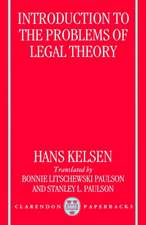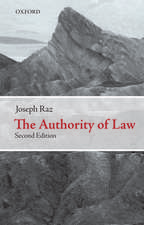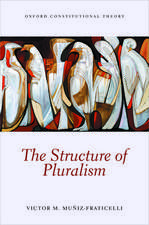Objectivity in Law
Autor Nicos Stavropoulosen Limba Engleză Hardback – 4 apr 1996
Preț: 832.05 lei
Preț vechi: 1263.53 lei
-34% Nou
Puncte Express: 1248
Preț estimativ în valută:
159.21€ • 166.65$ • 132.52£
159.21€ • 166.65$ • 132.52£
Carte tipărită la comandă
Livrare economică 19-25 martie
Preluare comenzi: 021 569.72.76
Specificații
ISBN-13: 9780198258995
ISBN-10: 0198258992
Pagini: 228
Dimensiuni: 163 x 242 x 18 mm
Greutate: 0.51 kg
Ediția:New.
Editura: Clarendon Press
Colecția Clarendon Press
Locul publicării:Oxford, United Kingdom
ISBN-10: 0198258992
Pagini: 228
Dimensiuni: 163 x 242 x 18 mm
Greutate: 0.51 kg
Ediția:New.
Editura: Clarendon Press
Colecția Clarendon Press
Locul publicării:Oxford, United Kingdom
Recenzii
Applying, as it does, a sophisticated philosophical analysis to questions of interpretation, objectivity, the relations between law and morals, and to figuring out Ronald Dworkin's work, this book is important reading for the serious scholar of analytical jurisprudence, including the serious undergraduate.
This ingenious book ... makes too many challenging arguments in favour of Dworkinian interpretivism even to list in a review ... his complex and challenging book shows that jurisprudence is essentially controversial.
In order to follow the argument, a fair degree of acquaintance with contemporary semantics, meta-ethics and jurisprudence is required. That said, anyone who is interested in any of these fields may find herself provoked and stimulated by this bold attempt to rescue law from indeterminacy.
The arguments against ethical noncognitivism are elegant and powerful
This ingenious book ... makes too many challenging arguments in favour of Dworkinian interpretivism even to list in a review ... his complex and challenging book shows that jurisprudence is essentially controversial.
In order to follow the argument, a fair degree of acquaintance with contemporary semantics, meta-ethics and jurisprudence is required. That said, anyone who is interested in any of these fields may find herself provoked and stimulated by this bold attempt to rescue law from indeterminacy.
The arguments against ethical noncognitivism are elegant and powerful


















